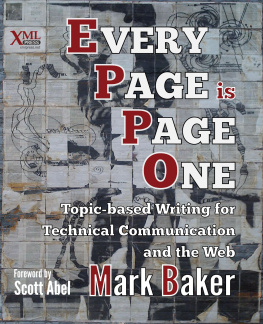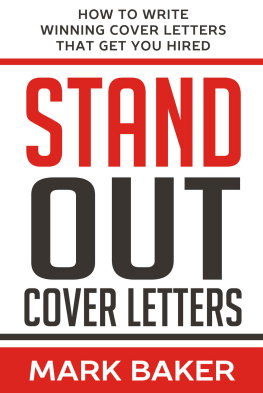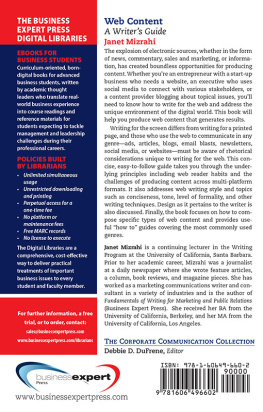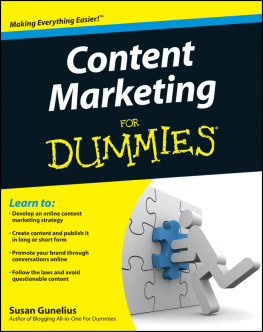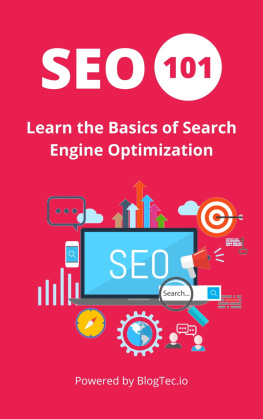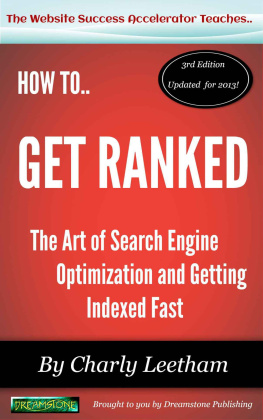Foreword
DTRITTRPATRTITRLAFOTDOTCC is probably the longest acronym youve ever run into. While it doesnt roll off the tongue easily, and its difficult to memorize, it is the acronym that most represents the intent of the modern technical communicator:
To deliver the right information to the right person at the right time in the right language and format on the device of the customers choosing.
How to go about accomplishing this goal has been the focus of technical communication and content strategy thought leaders around the globe. Ann Rockley, Rahel Bailie, Sarah OKeefe, Robert Glushko, JoAnn Hackos, Joe Gollner and others have spent considerable time thinking through the challenges involved in accomplishing this lofty goal. They (and others in our field) have developed, tested, and implemented methods, standards, and tools designed especially for tackling this challenge. And, theyve willingly shared best practices and lessons learned discovered along the way.
Out of this body of knowledge came important innovations single-sourcing, multi-channel publishing, component content management, and structured authoring process improvements that resulted in the elimination of unnecessary manual tasks, the automation of tasks best performed by computers, and tremendous savings in content destined for translation.
While there is no doubt that these efforts created tremendous value for the organizations we serve, did these improvements help us create better content?
In Every Page Is Page One, Mark Baker argues that our focus on serving the needs of the organization has done little to improve the usefulness of our content. Single-sourced, multi-channel, XML publishing projects can indeed help organizations save money (compared to less efficient production methods), but these methods dont do much to improve the value of the content to those who matter most: our audience.
While not everyone will agree with his thinking, Baker makes valid points that deserve to become part of our professional discourse. For instance, why do documentation projects continue to follow outdated publishing models? Are DITA topics appropriate for the web? Are they really self-contained information modules? And, assuming they are, do they provide the context required of people who stumble across them while foraging for information in a web browser, perhaps on a tablet or a smartphone?
Part manifesto, part textbook, Every Page Is Page One should be required reading for all technical communication professionals. Not only is this book loaded with thought-provoking ideas about how we might increase the usefulness of the content we create, its also loaded with information that software and services vendors need in order to create tools that help technical communicators DTRITTRPATRTITRLAFOTDOTCC.
My advice: Read this book and take its lessons into account when you create your next documentation project. If you do, chances are youll improve the utility of your content and dazzle your audience. Who knows, you might even create content that your customers find useful content they might actually want to read.
Scott Abel
The Content Wrangler
October 2, 2013
Preface: In the Context of the Web
There is a scene in the James Bond movie Skyfall in which Bond approaches the bad guys lair, an island covered by spooky abandoned tenements. It is a striking image, so while I was watching the scene, I pulled out my phone to see if its a real place. It is. It is Hashima Island in Japan, an abandoned mining town. Im not alone. Going online while watching TV is something most people do these days.
In addition, I use Google Maps to follow the heros journey when I am reading fiction and to check assertions and follow tangents when I am reading non-fiction. Even when the content I am consuming is not on the Web, I am.
This is highly important because it means that there is really no such thing as off-line content anymore. Even if the content is not found online, it is consumed online because the reader is online. This means that the way readers consume content online is now the way they consume all content, because they are always online. All content is consumed in the context of the Web.
Gerry McGovern reckons that the very idea of going online is outdated. We simply are online, all the time. The Internet has become so pervasive that people dont think they are on it anymore, even when they are. Today we live, work, and read in the context of the Web.
When I was growing up, I had access to a town library, a bookstore at the mall, and a university library. I thought I was living in an age of information abundance. Today I realize that I was living in a age of information scarcity that was, in terms of practical access to information, closer to the middle ages than to the modern world. We live in an age of cheap and abundant information. Of course, abundance is not the same as quality, but abundance on this scale profoundly changes the culture and economics of information.
Technical communicators must adapt to these changes as they design, organize, and deliver content. They can no longer create help systems and manuals as they have in the past; customer expectations have changed too much.
Even for documentation that is not on the Web, all the recent customer feedback data I have looked at indicates that users do not think in terms of individual manuals and references. They only think of the documentation, and they expect to be able to search and navigate it as one resource. Even if the documentation is not on the Web, readers expect every search to work like Google and every documentation set to work like the Web.
I call this change of expectations: Every Page is Page One . People have multiple sources of information available all the time, and they hop freely from one to another. Authors dont dictate the reading order, readers do. And with every hop, readers arrive at a new page one.
Every Page is Page One is both an information design pattern and a content navigation pattern. For readers who live and work in the context of the web, Every Page is Page One is the dominant mode for finding and using information. Even if your content is not (or not yet) on the Web, you and your readers are best served by content that is written and organized for this new reality.
In this book, I discuss how the Web has changed the way people find and use information, how to adapt to these changes, and how to create content that is usable and navigable in an environment where Every Page is Page One.
1. Audience
This book is for technical writers, information architects, content strategists, and anyone interested in designing information that will be consumed on the Web or in the context of the Web. Even if you produce manuals and help systems, your users now consume your content in the context of the Web, with beliefs and expectations formed on the Web. This book is for you too.
Every Page is Page One is an information design pattern, not a technology. You can create Every Page is Page One content in any medium and with any authoring tool. Though certain kinds of tools can definitely help, Every Page is Page One does not require a tool change. Whether you work in DITA, FrameMaker, Word, a wiki, a Web CMS, or with pen and paper, this book is for you.

